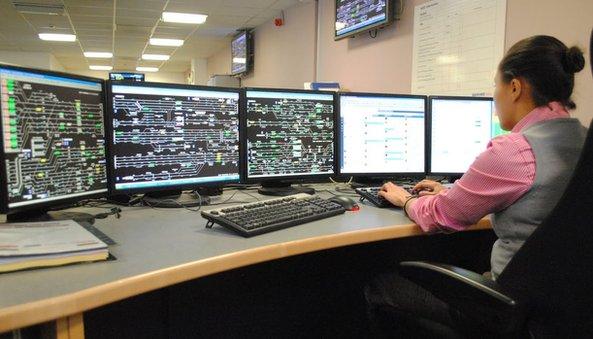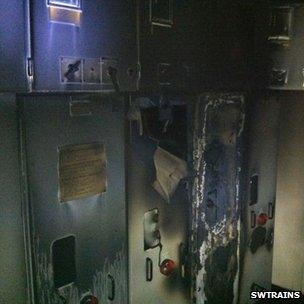Handling the London Waterloo rush hour on Twitter
- Published

South West Trains' Allison Dunn runs the company's social media presence from the control centre at London Waterloo
It was 15:30 on a Wednesday, and a man was threatening to throw himself off a bridge and into the path of an oncoming train.
As emergency services tried to talk him to safety, which they did, Allison Dunn was left with a different problem - the rush hour.
As South West Trains social media head, she knew thousands of commuters were about to descend on Waterloo - London's busiest terminal - and many would turn to their phones for information.
At 15:33, she tweeted on the official <link> <caption>South West Trains Twitter account</caption> <url href="https://twitter.com/#!/SW_trains" platform="highweb"/> </link> : "All lines through Wimbledon station currently blocked owing to emergency services dealing with an incident at Wimbledon. More to follow."
There was a lot more to follow . By the end of the evening more than 150 tweets had been sent out - double the usual number.
Heart of the network
In an Olympic year, many transport companies are looking to social media as a way of keeping their customers informed. Most of the major mainline train operators have a presence on Twitter and Facebook, as do airports like Heathrow and Stansted.
London Underground has set up a personalised Twitter feed for each of its lines, responding to commuters' questions and concerns.
Allison's desk features a formidable technological set-up. Situated in the heart of the network control centre at Waterloo, she watches over five monitors, each detailing intricate data on the whereabouts and condition of the trains.
She is able to pull up fault logs, check out CCTV images and spot congestion.
One of these monitors is dedicated to Tweetdeck, the tweeting tool that enables users to run keyword searches on the micro-blogging platform. She looks out for any mentions of key station names and other relevant phrases.
"We had a door problem at Winchester," Allison says.
"I was sitting on the desk and a passenger tweeted me - I let the guys here know that we've got a problem with the train at Winchester, before the guard had actually picked up his phone to let us know it had happened.
"That was when everyone here started saying, 'Wow'."
'Nervousness'
Those kind of moments encouraged a change of stance from some of the less digitally inclined staff at South West Trains.
"I'd be lying if I said there wasn't a nervousness about it," says customer information manager Adam Piddington.

Allison Dunn admits the name-calling in tweets sometimes affects her
"I was quite sceptical. My views were changed very quickly when I saw how powerful a medium it was."
At first the company found it hard to stomach some of the more hostile messages from passengers.
"Whilst we were setting it up, we were watching what people were saying about us - which was quite shocking, in some cases."
Another difficulty was how to deal with the existing members of staff already unofficially tweeting on the company's behalf.
"We had some members of staff who had basically been fulfilling the role that we probably should have been fulfilling. We were quite nervous about members of staff doing this, and what they were saying.
"We found very quickly that there was nothing sinister or hidden about all this - they really helped us in the early days. When we started we were quite stilted - you need to be conversational but professional."
'Idiots'

After complaints about disruption due to lightning, Allison was able to post a picture of the damage
Back at Waterloo's control centre, Allison's cheery approach is all the more admirable when you can see the constantly updating stream of replies from travellers.
"Hang your head in shame," reads one from a customer unhappy with a slow train near the notoriously hectic Clapham Junction. "Idiots," says another.
But Allison is unruffled. "It gives me a buzz," she says.
"I'm one of those glass-half-full kind of people. People have valid points - I try and respond to them in a way so that they know that I know what I'm talking about.
"Twitter allows us to talk to people in a manner we've never been able to, on a one-on-one basis, which I really do enjoy.
"If we're severely disrupted, sometimes it does impact on you, seeing what people are saying. The name-calling, that sort of thing.
"You really do have to put yourself in their shoes and feel their pain, because they're the ones that are paying us to run this train service.
"If we're not delivering it for them we need to be able to tell them what's going on, and just be honest about it. That's what I do."
- Published4 June 2012
- Published22 June 2012